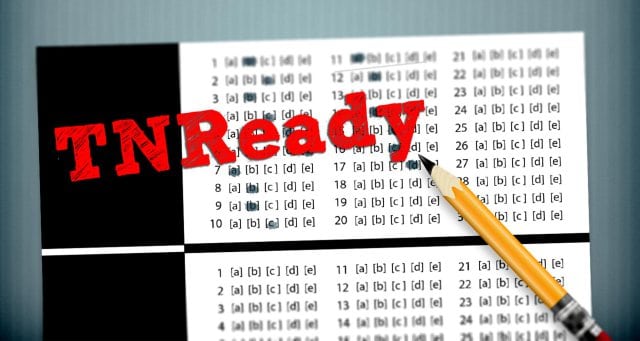Most of Tennessee’s elementary and middle school students are lagging in English and math, many significantly, according to statewide scores released Wednesday after a two-year gap in testing.
Two-thirds of students taking the state’s new test this spring scored below grade level in English language arts, with a slightly better showing in math.
Of those, 48 percent were “approaching” expectations in English and 36 percent in math, while more than a fifth fell far below expectations in both subjects.
As expected, students did significantly better on the state’s science tests, which were based on standards that have been in place since 2008. Tennessee will switch to more rigorous science standards and a harder exam next school year.

The low scores for English and math for grades 3-8 were expected under the state’s transition to a new test aligned for the first time with more rigorous Common Core standards, which have been in classrooms since 2012. (Tennessee students had performed significantly better on its previous TCAP exams, which did not emphasize critical thinking skills and were based on outdated academic standards.)
The new TNReady scores mirror the poor performance of high schoolers last year in their first year under the new test and tougher benchmarks. The expectation is that grade-schoolers’ scores will begin to rise next year, just as they did for high schoolers for the most part this year in their second year of testing.
Education Commissioner Candice McQueen said the results, while sobering, represent a new baseline for Tennessee. She emphasized the need for presenting a more accurate picture of student performance that is consistent with national testing.
“This is a key moment for our state, as we are now transitioning to the point where we have a true understanding of where students are from elementary through high school, and we can use that information to better support their growth,” she said in a news release.
At the same time, McQueen gave Tennessee an “A” for honesty and transparency about the readiness of its students, in contrast to the “F” it earned in 2007 from the U.S. Chamber of Commerce for “truth in advertising.” At the time, a wide gap existed between the results of the state’s test and national tests like the National Assessment of Education Progress, known as the Nation’s Report Card.
“This is a big deal,” she told reporters during a morning conference call. “We see this as an opportunity and a reset moment for Tennessee. We’re now sharing better, more honest information about where our students are … and can move forward.”
The long-awaited scores will begin to bridge the two-year gap in standardized testing data that began in 2016 when McQueen canceled TNReady for students in grades 3-8 because of a series of technical and logistical snafus under the switch to online testing.
The void has challenged the state’s once-vaunted system of accountability, forcing educators to depend on mostly local assessments to inform them about which students are growing and where they need more support.
McQueen said educators are already digging into the district- and school-level data they received last week under a public embargo. Those nitty-gritty results will be released later this fall using a new score report designed to help parents and teachers better understand where their students stand. The state also plans to provide reports in the weeks ahead to highlight the performance of historically underserved students.
The commissioner expects her department to distribute all scores much sooner next year, allowing educators to make adjustments in courses and planning before the new school year starts. The first year under a new test requires an extended scoring and review process, which included approval of grading thresholds by the State Board of Education.
Correction: Oct. 4, 2017: This story has been updated to correct how test scores are characterized. Because of the way Tennessee’s tests are designed, the scores reflect the proportion of students who met the state’s standards, not the proportion of students who passed the test.



